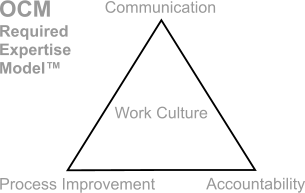Organizational Change Management (OCM) Methodology – Strategy-Technology Adoption:
Large-scale strategy/technology initiatives are some of an organization’s largest, most important, and highest risk investments. Smooth and rapid technology adoption will avoid risk to competitive positioning, revenue generation, and even leaders’ careers. Competent OCM expertise is, therefore, one of the most important success factors for any sizeable project.[pullquote align=”full” cite=”” link=”” color=”” class=”” size=””]Competent OCM expertise is one of the most important success factors for any sizeable project.[/pullquote]
How Does Prosci-ADKAR® Compare with SMG’s Change Methodology?
[similar, but with more emphasis on leveraging past successes and realigning individual accountabilities]
1. Awareness of need
2. Desire to (support) change
3. Knowledge of how/what to change
4. Ability to implement skill/action
5. Reinforce to sustain the change
ADKAR describes many important change management aspects but based on SMG’s formal research with 72 organizations, several issues arise which must be addressed to deliver crisp, risk-free change. These issues are:
• History: Starting only with the deficiencies of the current state, and not acknowledging staff’s innovation and effort to create that current state is a recipe for resistance.
• Assumption that individuals are ‘free’ to modify tasks: While senior roles have considerable freedom in how they accomplish their roles, managers and staff roles already have a collection of specific accountabilities around which they configure daily routines. Presenting reasons does not change, nor align, their existing accountabilities.
• Reinforcement is often left to last and incentives often create negative outcomes: Developing and implementing specific adjustments to accountabilities for affected roles is challenging, detailed work. As a result, ADKAR’s reinforcement in practice can often be a recognition of participation and/or a hastily-crafted, problematic incentive.
1. Research achievement history; define performance gap
2. Link ‘business case’ to previous achievements
3. Fully educate as to what/how should change
4. Equip re: task execution, realistic expectations, transition skills
5. Revise all reinforcement elements to align with/sustain change
SMG’s Change Methodology addresses these and other issues to reduce risk and speed adoption:
• Honor history: SMG researches past successes and the people and attitudes that enabled them.
• Link business case to past achievements: A full justification for the proposed change is presented with an appeal for the same energy and innovation that led to past achievements.
• Process transition skills/expectations reset: SMG’s process experience lets us set realistic expectations and pass on practical transition skills to departments and managers.
• More that just process actions: SMG knows modifying/sustaining process actions requires corresponding changes to leadership and collaborative behaviors – so they are included in the accountability reset for a holistic change.
• Realign accountabilities to sustain new behaviors: SMG adjusts four elements to align accountabilities to support desired change.
• Incentives are powerful, but problematic: SMG’s research on organizational reinforcing structures means incentives are rarely employed while more effective motivational mechanisms are used first to lower risk and lift collaboration.
Communication Alone is Not Enough
Organizational change methods are frequently simplified in practice until the remaining visible tactic is a relentless, multi-media communication program issuing out from a ‘powerful’ steering committee. This shorthand approach rarely delivers smooth adoption.
In Streamlined Management Group Inc.’s (SMG’s) research and experience, successful organizational change management (OCM) contains four elements of which a comprehensive communication program is important, but all four are essential for success.
SMG’s OCM Approach

SMG has an industry-leading, comprehensive, metric-driven approach to communicating, motivating, and facilitating required project support activities. It provides project leadership with the information needed to gauge change readiness at a departmental level, which allows change resources to be selectively deployed where and when needed. It provides organizational leadership with its key tool to assess and manage their support of the project. It is powerful, effective, time-efficient, and absolutely, a career-saver.
SMG OCM Required Expertise Model™
1 – Work Culture
2 – Communication
3 – Process Improvement Expertise
4 – Accountability
Missing Expertise = Higher Project Risk
SMG Can Join Your Existing Team
SMG OCM Client References
[pullquote align=”full” cite=”” link=”” color=”” class=”” size=”16″]SAP-ERP Project —”Keith and I worked together on a major Business Transformation initiative for one of Canada’s largest construction companies, and Keith was driving the Organizational Change Management (OCM) effort. Keith designed a metrics based approach to change management that, when implemented, created actionable results in assessing and improving business readiness. In my 20 years of experience managing large business transformations, Keith’s contributions and leadership to the OCM effort stands out as being innovative and effective.” Peter Getchell Managing Director – Navint[/pullquote]
